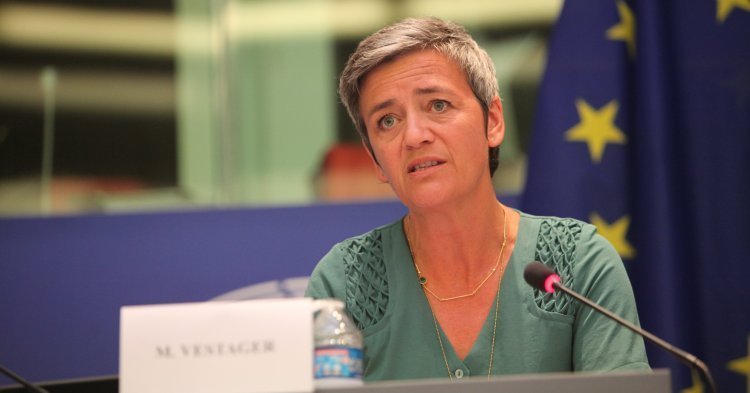The principle of competition appears numerous times in the European treaties (TEU and TFEU). American antitrust law and German ordoliberalism have been woven together to form a body of European competition law which has played a central role in the treaties since the ECSC in 1951. The Treaty of Rome kept this position at the core of its policies and divided European competition law into four main strands: cartels, abuse of dominance, state aid (a concept unique to the EU), and mergers of market-dominant companies.
The fact that the EU is often perceived by its citizens as an economic project, the single market, is partly a result of the bloc’s competition policies. The 2004 Treaty establishing a Constitution for Europe even proposed including “free and undistorted” competition in the values promoted by the European Union. The Treaty of Lisbon ‘only’ refers to a “highly competitive economy”. A protocol annexed to the Treaty stipulates that the fundamental nature of competition policy means it can be considered a “constitutional principle”.
Just like his predecessors, Jean-Claude Juncker and his team have defended European competition policies tooth and nail – often to the EU’s advantage.
The manifold interests of the EU in competition matters
Competition Policy is one the (too) few domains where the EU has exclusive competence. A federal competence, if you like. The European Commission has the final say on mergers, cases of abuse of dominance, and state aid that risks hindering the smooth functioning of the single market. This means that, even if it could be improved in many ways, such as European Parliament oversight of the work of the Commission, competition policy is (usually) implemented independently of the member states and in accordance with the EU’s common interest.
But what exactly is that common interest? Competition policy is supposed to allow for the European single market, the truest embodiment of the European project, to function as flawlessly as possible. It should ultimately allow citizens and consumers to benefit from high-quality goods and services at low prices all across Europe. Competition is thus seen to be an essential pillar of a European Union which, as it happens, has largely remained an economic project. This also raises questions about how citizens identify with the Union and will be a key question in 2019 in the context of the European Parliament elections.
Yet the Juncker Commission seems to have attributed a far greater role to the question of competition policy than previous Commissions. Margrethe Vestager’s battle against the GAFA (American tech giants) is the most obvious example. Denmark’s former finance minister has not held back in fighting against the wide-scale influence and cheating practised by Google (which has just some weeks ago been punished again with a €1.5 billion fine), Facebook or Apple, in pursuit of fiscal justice in the EU. In this example, it is interesting to note how the EU has de facto been shaping the beginnings of a fiscal policy, whilst fiscal harmonisation portfolios like CCCTB [1] and GAFA taxation are progressing at a desperately slow pace. Competition policy is, therefore, bridging the gap caused by the lack of other policies necessary for the smooth functioning of the single market, such as fiscal policy.
Margrethe Vestager, from top to flop in Brussels?
European competition policy has become more dynamic as a result of Vestager’s proactive approach. A charismatic politician (she even inspired the character of Birgitte Nyborg in the series Borgen), Vestager has asserted herself as the face of the European executive. Sticking to her convictions has helped her to overcome criticism. As one of her advisors told me during a visit to the Commission, “Ms Vestager knows that she has the support of 500 million European citizens”. [2]
A distinctly different situation than the one her predecessor, Joaquin Almunia, found himself in. The Spaniard was rather quick to compromise, even on his principles, when it came to the technology giants. The digital economy is not the only target of Margrethe Vestager; her rejection of the merger between Alstom and Siemens which would have created a European railway giant shows that she intends to follow competition law to the letter, despite pressure from national governments. Previously, she accepted the merger between Bayer and Monsanto, on the condition that assets were divested to BASF.
But one question haunts observers of EU politics: what does the future hold for Margrethe Vestager after the European Parliament elections? Some see her as a potential (and desirable) President of the European Commission – which would likely mean the most powerful head of the European civil service since Jacques Delors. Nevertheless, several obstacles block the candidacy, as hypothetical as it may be, of the Danish Commissioner. First and foremost, the fact that she belongs to the European Alliance of Liberals and Democrats (ALDE). According to the Spitzenkandidaten procedure, this would almost instantly disqualify her since the two largest traditional groups in the European Parliament (the Socialists and Democrats, and the European People’s Party) have systematically topped the votes in the EP elections.
Unfortunately, there is a chance that the heads of state will renege on the Spitzenkandidaten procedure, which would end up being good news for Margrethe Vestager. However, she does not seem to have the backing of her national government, even to stay in the post of competition Commissioner after 2019. Despite being the uncontested star of Brussels for the last five years, Margrethe Vestager’s aura does not seem to glow so brightly in Copenhagen.
The key debate between competition policy and industrial policy
Indeed, her aura has become ever dimmer since the Commission’s rejection of the Alstom-Siemens merger, which caused an outcry in France and Germany. Beyond this hostile reaction in the two most powerful countries in Europe (after all, who would so much as blink if the Commission vetoed a merger between Latvian and Hungarian companies, even if they had represented a similar market share?), the rejection by the European Commission has instigated a lively debate on how to balance the EU’s competition and industrial policies.
Even if some see these policies in opposition to one another, there is a certain complementarity between competition and the emergence of a European industrial policy. The latter is advancing in accordance with the applicable exemption system, provided for in the Treaties and in secondary legislation (in particular article 101.3 TFEU, which allows agreements between companies to facilitate technological and social progress, or the General Block Exemption Regulation GBER, which allows certain state aids on the condition that consumers will benefit in the end). Whilst we are witnessing the beginnings of a compromise in some priority areas of the EU’s industrial policy (in particular in the fields of energy transition and technological innovation), differences in opinion persist on how to best go about this.
The French finance minister Bruno Le Maire and his German counterpart Peter Altmaier announced their intention to draft a “Franco-German Manifesto for a European industrial policy fit for the 21st Century”, revising European competition rules. Nevertheless, it is highly unlikely that other countries will follow their lead: some see it as just the latest Franco-German war horse, others see it as an attack on their cherished competition rules. This is the case for Spain, whose Prime Minister Pedro Sanchez welcomed the manifesto with interest, provided it would not undermine competition law. To keep astride with globalisation, we need a more proactive European industrial policy, based on the consolidation of European companies working in frontier technology sectors, and to embrace the use of existing instruments, such as commercial policies, to combat unfair international competition.



Follow the comments: |
|
